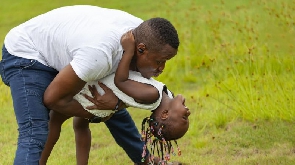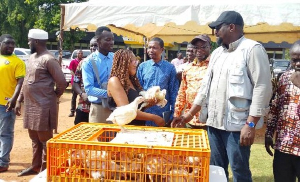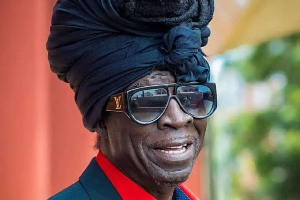Me and my siblings always sabi wen our middle brother dey come house, na dat time my mama go make small bowls of prawn cocktail, as special appetizer.
We go call am, "prodigal son", sake of say we dey beef say we no dey get dat kain treatment but wetin dem tell us be say e no too dey come for Sunday lunch like di rest of us.
True-true, apart from dat prawn cocktail, I no tink my parents get favourite. I be one of six pikin dem from north London. We all get work wey we dey do for di family and e make sense. Me, wey be last born dey go carry tins for my parents, maybe dem bin tink say na me get energy pass. My sister, na she dey do di shopping because she fit drive.
Las-las e be like, e dey equal. But last year, my brother tell me say e tink say na be my papa favourite.
Na dat time I sabi say more fit dey di tori I tell myself say my parents no get favourites. I come dey wonder how pipo for my family and oda families dey see dis kain tin and how e fit shape us for future for ways wey we fit no even know.
Research suggest say parental favouritism dey very common and no be just weird tin for family, e fit dey very harmful. E dey for 65% of di families wey dem identify and study from different cultures. As e common reach, e fit damage pikin wellbeing for all dia life, from childhood enta middle age and pass sef. Dem see am as such an important factor for plenti emotional problems sotay psychologist get name and acronym for am "parental differential treatment" or PDT.
How PDT dey affect pesin life
But like di tok I bin get with my brother, siblings for di same family fit disagree weda dia family bin get am. Laurie Kramer wey be applied psychology professor for US Northeastern University say na because e dey subjective. "Na di experience wet pipo get say parent prefer one child to dem. Weda na by giving more time , attention, praise or affection. Ir putting down less law so dem no go face di kain punishment wey di oda one go face."
E dey important to note say, no be everbodi for family go see am like dat. Kramer say, "dis fit no be di same observation from wetin di oda sibling see to wetin di parents tink say dem dey do."
For di pikin wey feel like dem dey treated as second best, di effects fit loud. Research show sat from early age, pikin sabi wen parents dey treat dem different. Dat kain parental favouritism wey dem feel dey linked to low self-esteem for pikin, plus childhood anxiety, depression and behavioural problems wey fit include risky behaviour.
Researchers for China find out say parental favouritism fit cause phone addiction for adoloscents. For small Canada study of eight homeless teenagers, seven say dem feel like dia parents favour dia sibling pass dem, while dem na di "problem child" and na wetin add to di breakdown of di family.
While dis final study bin dey too small to draw wider conclusions, e fit show how far child favouritism fit go.
Di mental health impact fit enta adulthood as mama favouritism dey linked with higher depression scores for dia adult pikin. Dis bias fit reach adult hood self wia di parents still dey play favourites afta dia children don grow. Dis fit harm di sibling bond and increase tension and kasala between di siblings. Dis dey worrying sake of say to get beta relationships with our siblings dey important for our lifelong health and happiness.
If e dey spoil tins like dis, parents fit no just get favourite?
Kramer see am say dem no dey do am on purpose and fit no know say dem dey do am. She say "preferential treatment by parents fit start sake of say one pikin de easier to parent and dem fit relate with dat pikin pass as dem see how di pikin take afta dem."
Her research for adolescents and dia parents show sa families no dey too tok about am wey dey make am harder to clear di pain and misunderstanding.
Kramer say, "if dem tok dis mata for sensitive way, wia no pesin feel like say dem dey blame dem, you fit get more open conversation for everybodi to fit understand." For instance, parents fit ask why one pikin fit feel like dem prefer dia brother. Kramer say, "if parents listen and give reason why dem dey treat dem different, e fit work wonders." Di pikin fit see say reasonable reason det and no be say di parents love di broda or sister pass.
For my family we neva tok di mata of favouritism before too but afta wetin my broda tok, I decide to find out more.
First, I ask my broda why im bin tok like dat. E tell me say my papa bin shout on am afta e scare me with one cartoon and make me cry. I no remember but e fit be because no be me dem dey shout for.
As me and my siblings dey tok, we remember say my mama dey sometimes give our oldest brother beta treatment, maybe because e be her firstborn. Our papa on di oda hand dey often hail our brother say e dey smart like am, and again di mata of di prawn cocktail wey dey only comot wen our middle broda dey come.
Na small differences but e dey easy to see ghow e fit increase to sometin wey go cause beef. E dey possible say di impact reduce because di five of us wey no get "prawn cocktail treatment" fit joke wit about am, and we go follow chop wen our brother come. Imagine if na family with two adult pikin, and one dey get prawn cocktail lunch nad di second one dey always get di ordinary lunch, e fit feel like punishment for di second pikin.
Being di 'Golden Child' still get wahala
Megan Giligan, wey be associate professor for human development and family science for di University of Missouri follow Jill Suitor, sociology professor for Purdue University and Karl Pillemer, psychology professor of Cornell University to work on di Within-Family Differences Study for di US, wey dey funded by National institute for Aging. Di project don track different families for 20 years to get beta understanding of relationships between generations. As part of di study, dem ask mama and papa dem who dem like pass, and many neva hear dat question before.
Di question na: "Which of your children, yo feel emotional closeness to pass?" Afta some tinking 75% of mama dem call one of dia pikin, di odas say dem close to dia pikin in di same way.
Birth order get role for dis favouritism mata but e no dey happun often like dat, "Gilligan sat, "for adulthood, research no find am to be di main predictor of favouritism."
So my guess say na first born be natural golden child no get scientific backing. Last born dey more likely to dey emotionally close, according to Gilligan but wetin be di strongest factor na who di parents feel say resemble dem pass.
Gilligan also tok di real damage wey fit come from dis differential treatment like poor sibling relationships, di less favoured sibling feeling bad about demselves and dem go get less positive relationship with di parent.
Being di "golden child" sef get im own wahala. Gilligan say, "you go expect sat di favourite pikin dey get plenti benefits vit e fit cause emotional distress wen di pikin turn adult. We don see dat favouritism dey lead to higher depressive symptoms for di favourites. We tik say na because mama pet dey create wahala in dia relationship with dia siblings. We find say dis sibling beef dey cause wahala for adulthood for dia psychological well-being."
E fit also cause unequal burden for later life, Wen di parent need care, dem fit turn to di most favoured one.
And while favouritism fit affect us adults, how we dey experience am, dey slowly change as we age. Gilligan don author review of studies on i impact of favouritism as we dey grow, from small pikin to grown pikin wey don even pass dia 60s. She see say differences dey for different stages dey diffentnt. For small pikin, favouritism fit be how much time parents dey spend with dem compared to dia sibling. For adult pikin, e fit be unequal financial support.
How to solve di favouritism mata
Di solution no be to treat all your pikin di same sha. Kramer say, "e dey impossible to treat your pikin exactly di same for every kain situation, and no be wetin children want. Dem want make you understand dem for who dem be, dia age, interest, gender and personality." She say to dey more self aware fit help parents to avoid consistently causing unfair situations. Dis dey important as di pikin fit learn dis favouritism and wen dem grow use am for dia own parenting style and relationship.
Di idea say you fit learn certain bias from our parents dey ring true, my mama bin dey always give slightly more food to my brothers as dem be "growing boys". My partner don see say I dey put am more food than I dey chop wen I dey give am evening food.
I no feel traumatised for di way my siblings bin dey treated as siblings and today. We dey close to our parents andand each oda. Looking back na our dog, Sheba fit be my papa real favourite.
But to become more aware of di differences in treatmentand how dem don shape my behaviour don make me see tins for new light. Like I fit try to give myself more food for future or I no go wait for my broda to come house before I chop prawn cocktail.
BBC Pidgin of Saturday, 19 August 2023
Source: BBC
















